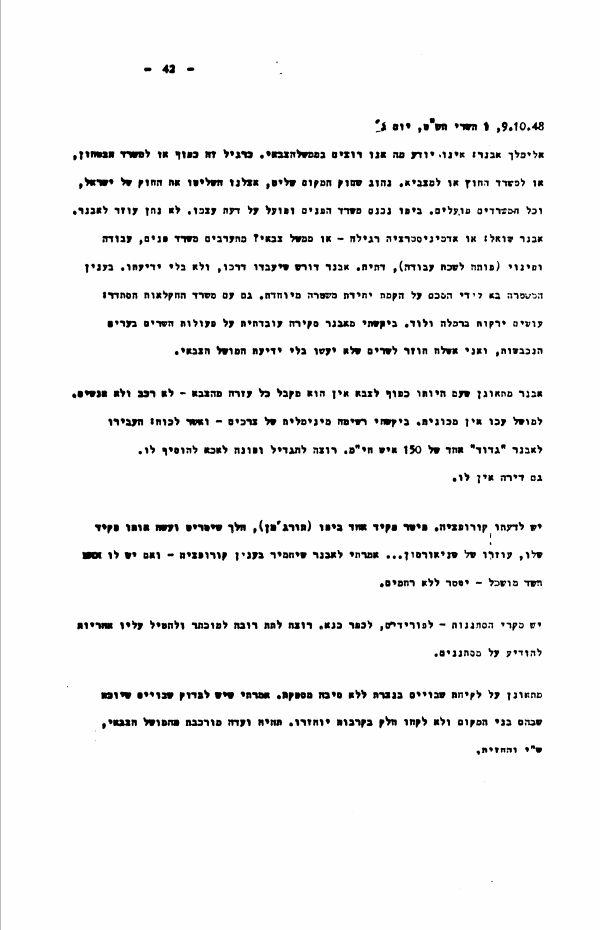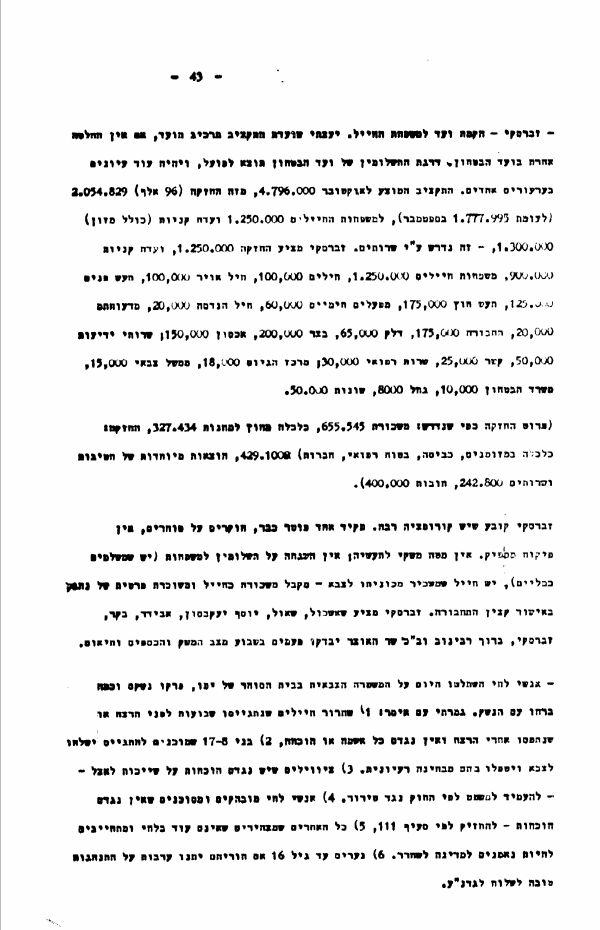[Saturday,] October 9, 1948
Elimelech Avner [commander of the military government]: He doesn't know what we want with a military government. Usually it's subordinate to the Ministry of Defense, or the Foreign Ministry, or the military leadership. Customarily local law governs, here the law of Israel has been imposed, and all the ministries are operating [in the field]. The Ministry of the Interior has entered Jaffa and is operating of its own accord. Avner wasn't given an assistant. Avner asks: either a regular administration - or a military government? The Ministry of the Interior, [the Ministry of] Labor and Construction ([which is] opening an employment bureau), [the Ministry of] Religious Affairs are intervening. Avner insists that they work through him, and not without his knowledge. On the matter of the police he reached an agreement for the establishment of a special police unit. He also reached an arrangement with the Ministry of Agriculture: vegetables are produced in Ramle and Lod. I asked Avner for a factual survey of the activities of ministries in occupied cities, and I'll send a memorandum to ministers not to act without the knowledge of the military governor.
Avner complains that while he's subordinate to the army, he's not getting any assistance from the army - not in vehicles and not in personnel. The Acre governor has no car. I requested a minimal list of needs - and as to force: Avner was provided with one "battalion" of 150 garrison men. He wants to increase [it] and is approaching the Personnel Department to provide him with more. He also has no apartment [office].
In his opinion there's corruption. He fired one administrator in Jaffa (Turgeman), Sheetrit went and made him his own administrator, assistant to [Pinchas] Schneerson [in the Ministry of Police]. I told Avner to be harsh on the matter of corruption - and if he has an informed suspicion - to fire without mercy.
There are instances of infiltration [returning to villages] - to Fureidis [near Zikhron Ya'akov], to Kafr Kanna [near Nazareth]. He wants to give the mukhtar a rifle and assign him responsibility for informing on infiltrators.
He complains about [people] being taken prisoner in Nazareth without sufficient cause. I said that the prisoners should be examined. [Those] proven to be locals who did not take part in the hostilities, will be returned. There'll be a committee composed of the military governor, SHAI [Information Service, i.e., intelligence], and the Front.
- [Avraham] Zabrasky - [on] establishing a committee for the soldier's family. I suggested that the Budget Committee determine the composition of this committee, if the Defense Committee hasn't decided otherwise. The Defense Committee's wage scale will be implemented, and there will be some more reviews of a few objections.
The proposed budget for October is [P£] 4,796,000, of which upkeep ([of] 96,000 [personnel]) is 2,054,829 (as opposed to 1,777,995 in September), for soldiers' families 1,250,000, procurement committee (including food) 1,300,000 - that's what services require. Zabrasky proposes upkeep 1,250,000, procurement committee 900,000, soldiers' families 1,250,000, corps 100,000, air force 100,000, domestic Ta'as [manufacture of weapons] 125,000, foreign Ta'as 175,000, chemicals facilities 60,000, engineering corps 20,000, science and HTM [?] 20,000, transport 175,000, fuel 65,000, fortification 200,000, housing 150,000; information services 50,000, signal 25,000, medical service 30,000; recruitment center 18,000, military government 15,000, Defense Ministry 10,000, GAHAL [foreign recruitment] 8,000, miscellaneous 50,000.
(Breakdown of upkeep as requested: salary 655,545, economy [logistics and finances] aside from camps 327,434, upkeep: economy in cash, laundry, medical insurance, businesses) 429,100, special expenses of brigades and services 242,800, debts 400,000).
Zabrasky finds that there's a great deal of corruption. One official has already been fired, merchants are being investigated, there isn't enough oversight. There's no economic [financial and logistical] headquarters for industry; there's no oversight over payments to families (there are [cases of] double payments), there's a soldier who leases his vehicle to the army - receives a salary as a soldier and a private driver's salary, with the transport officer's approval. Zabrasky proposes that Levi [Eshkol], Shaul [Avigur], Yosef Yaakovson, [Yosef] Avidar, Aharon Becker, Zabrasky, Baruch [Rabinov], and a representative of the finance minister examine the state of the economy and finances and coordination twice weekly.
- Today LEHI men seized control of the military police at the Jaffa prison, disarmed them of their weapons, and a few fled with the weapons. With Isser [Harel] I decided: 1) To release [from imprisonment] soldiers who enlisted weeks before [Bernadotte's] assassination or were captured after the assassination and there's no charge or evidence against them. 2) 17-18-year-olds who are prepared to enlist will be sent to the army and will be seen to in terms of ideology. 3) Civilians against whom there's evidence of membership in ETZEL [should be: LEHI] - will be put on trial under the anti-terrorism law. 4) Definite and dangerous LEHI members against whom there's no evidence - will be held under article 111 [administrative detention]. 5) All others who declare that they no longer belong to LEHI and pledge to be loyal to the state - will be released. 6) Youths up to age 16, if their parents guarantee their good conduct, will be sent to Gadna [Youth Battalions].










